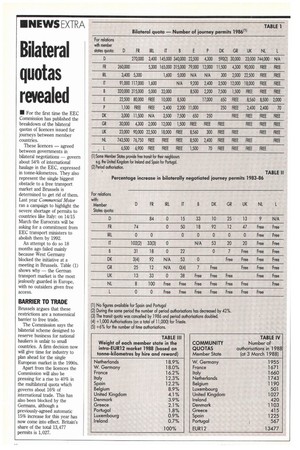Bilateral quotas revealed
Page 20

If you've noticed an error in this article please click here to report it so we can fix it.
• For the first time the EEC Commission has published the breakdown of the bilateral quotas of licences issued for journeys between member countries.
These licences agreed between governments in bilateral negotiations govern about 54% of international haulage in the EEC, expressed in tonne-kilometres. They also represent the single biggest obstacle to a free transport market and Brussels is determined to get rid of them. Last year Commercial Motor ran a campaign to highlight the severe shortage of permits to countries like Italy: on 14/15 March the Eurocrats will be asking for a commitment from EEC transport ministers to abolish them by 1992.
An attempt to do so 18 months ago failed mainly because West Germany blocked the initiative at a meeting in Brussels. Table (1) shows why the German transport market is the most jealously guarded in Europe, with no outsiders given free access.
BARRIER TO TRADE Brussels argues that these restrictions are a nonsensical barrier to free trade.
The Commission says the bilaterial scheme designed to reserve business for national hauliers is unfair to small countries. A firm decision now will give time for industry to plan ahead for the single European market in the 1990s.
Apart from the licences the Commission will also be pressing for a rise to 40% in the multilateral quota which governs about 16% of international trade. This has also been blocked by the Germans, although a previously-agreed automatic 15% increase for this year has now come into effect. Britain's share of the total 13,477 permits is 1,027.
































































































